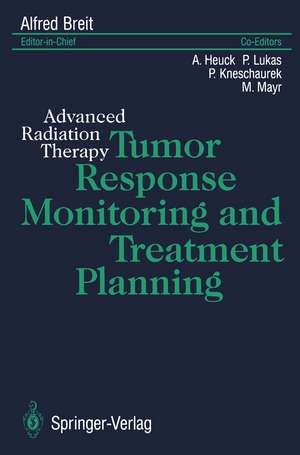Tumor Response Monitoring and Treatment Planning: Advanced Radiation Therapy
Alfred Breit A. Heuck, P. Lukas, P. Kneschaurek, M. Mayren Limba Engleză Paperback – 24 sep 1992
Preț: 398.35 lei
Preț vechi: 419.32 lei
-5% Nou
Puncte Express: 598
Preț estimativ în valută:
76.23€ • 81.51$ • 63.55£
76.23€ • 81.51$ • 63.55£
Carte tipărită la comandă
Livrare economică 17 aprilie-01 mai
Preluare comenzi: 021 569.72.76
Specificații
ISBN-13: 9783540547839
ISBN-10: 3540547835
Pagini: 840
Ilustrații: XXIII, 813 p.
Dimensiuni: 155 x 235 x 44 mm
Greutate: 1.15 kg
Editura: Springer Berlin, Heidelberg
Colecția Springer
Locul publicării:Berlin, Heidelberg, Germany
ISBN-10: 3540547835
Pagini: 840
Ilustrații: XXIII, 813 p.
Dimensiuni: 155 x 235 x 44 mm
Greutate: 1.15 kg
Editura: Springer Berlin, Heidelberg
Colecția Springer
Locul publicării:Berlin, Heidelberg, Germany
Public țintă
ResearchDescriere
Medical imaging progressed to a standard undreamt of notvery many years ago. The advances are due to continuousdevelopment of radiological techniques and the introductionof magnetic resonance imaging.With the improved and new methods three-dimensional targetvolumes for radiation therapy can be defined with hithertounknown precision. This leads to an improvement inirradiation techniques and, as a consequence, to a higherlikelihood of tumor control and a lower risk of normaltissue complications.Besides the improvement in irradiation techniques the newimaging methods may enable great strides in tumor responsemonitoring, not only in the detection of morphologicalalterations but also by showing physiological changes in thetumor during and after treatment by means of MRI and PET.This not only leads to better prognostic information but mayalso allow early evaluation of the response to treatment.It may then be possible to individualize the radiation dosebut also the alternative-treatment for non-responders.This is certainly a future direction for radiation oncology.















